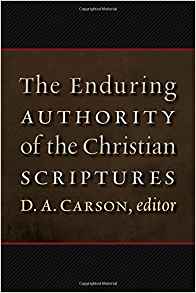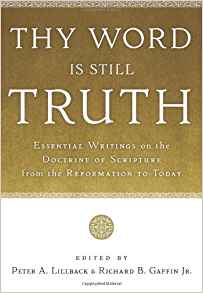 |
 |
Michael Bird mounts a critique of classical evangelicals who defend inerrancy of Scripture in his recent article, “Finding nuance in the inerrancy debate.”
I am a classical evangelical, that is, an evangelical who affirms inerrancy of Scripture. I confess being guilty of making a big issue of inerrancy of Scriptures, but I remain recalcitrant and unrepentant despite the sharp criticism levelled by such an enlightened mind like Michael Bird.
I disagree with Bird that a precise definition of inerrancy is a luxury for the global evangelical churches which are facing pressures from hostile authorities. To be sure, inerrancy needs not be the “number one issue that separates the good guys from the bad guys,” but based on my experience as a theologian living in the majority world, and as one who is committed to the Great Commission, I am concerned that a fuzzy commitment to the reliability and final authority of inerrant Scripture will undermine confidence and zeal for Christian witness in places where other world religions are predominant. For example, Christian witness to Muslims is likely to be abortive if Christians fail to defend the inerrancy of the Bible when Muslim polemists contend that the Bible is unreliable and contains errors.
I accept Bird’s suggestion that the biblical writers could have exercised “some degree of artistic license in narrating history.” However, I do not agree with Bird’s suggestion that we can “accept that the evangelists felt free to amend the details in the storytelling?” I suppose it depends on what one means by artistic license. Judging from the few examples given by Bird, I take it that when he writes, “to amend the details”, he is giving allowance to the gospel writers to change detail historical facts for the purpose of “special effects” rather than merely to exercise flexibility in their mode of narrating history which includes giving more concise but accurate summaries of events or arranging the events topically rather than chronologically. In this regard, the reference to Luke’s handling of historical sources and artistic licence should be circumscribed by an awareness that the status of Luke as a reliable historian of “habitual accuracy” has been confirmed by the research of William Ramsay, Sherwin-White, F.F. Bruce, Colin Hemer and Craig Keener. The brevity of Luke’s record of speeches in Acts assures us that Luke the historian is not inclined to indulge in artistic elaborations. Finally, James Dunn observes that the speeches in Acts reflect Luke’s summary of speaker’s views as best he can reconstruct them.
Bird submits,
Inerrancy should not be posed as an alternative to unbelief. As if one is asked: Do you believe in either (a) biblical inerrancy with Mosaic authorship of the Pentateuch, six literal twenty-four-hour days of creation, the historical existence of Jonah and Job, that all the psalms were written by David, the four Gospels were written independently, Paul wrote Hebrews, and the book of Revelation should be interpreted in a strictly literal fashion; or (b) a bunch of atheist, Marxist, liberal, secularized, Christ-hating, sacrilegious blasphemy of God’s holy word? Trust me, there is an option (c), which I’m trying to lay out for you.
Bird first poses a hard choice between two intolerable alternatives, after which, his third option seems so balanced and reasonable. However, the two choices he offers are contrived and unnecessary.
First, contrary to Bird’s allegation, classical evangelicals do not and should not simply accuse those who reject inerrancy as unbelievers. Least of all should they accuse those who reject inerrancy as “(b) a bunch of atheist, Marxist, liberal, secularized, Christ-hating, sacrilegious blasphemy of God’s holy word?” Dear me, Bird insinuates that classical evangelicals are such self-righteous and judgmental people. Of course, there could be some grass roots evangelicals who react pugnaciously to other believers who have some doubts about the propriety of applying the category of “inerrancy” to Scripture, but this should not surprise us. Grass roots Christians by definition comprises all kinds of believers, including overly defensive, if not hostile defenders of their pet doctrine. But surely, the same spectrum of defensive-pugnacious grass roots believers is also found among those who reject inerrancy? It is would be good for those who live in glass houses not to be too quick to throw stones.
Second, Bird dumps onto evangelical defenders of inerrancy a cluster of theological views which cannot be reasonably defended together, and indeed, these views should not be lumped together. I wonder who Bird has in mind when he considers how some classical evangelicals, because of their commitment to inerrancy, could end up defending all-together a disparate set of beliefs which include “(a) biblical inerrancy with Mosaic authorship of the Pentateuch, six literal twenty-four-hour days of creation, the historical existence of Jonah and Job, that all the psalms were written by David, the four Gospels were written independently, Paul wrote Hebrews, and the book of Revelation should be interpreted in a strictly literal fashion.” In effect, Bird incorrectly and unfairly paints classical evangelicals and some of the more extreme American Fundamentalist with the same brush.
As a classical evangelical who upholds inerrancy, I affirm the Mosaic authorship of the Pentateuch (with relevant caveats), the historical existence of Job (c.f. Ezekiel’s and James’ testimonies) and Jonah (c.f. Jesus’ testimony). However, I do not insist on a six literal twenty-four-hour days of creation (the length of the creation days is a moot point when it comes to interpreting the biblical texts). I believe that David wrote many Psalms, but even the book of Psalms indicates some of the Psalms are written by other writers.
As a classical evangelical, I practice synoptic criticism which is premised on possible inter-textual relationships between the gospels, that is, I do not accept Bird’s suggestion that accepting inerrancy entails believing that “the four Gospels were written independently.” I am aware that we do not have conclusive evidence about the authorship of the book of Hebrews, whether it could be Paul, Barnabas, Clement or Luke. Finally, who does Bird have in mind when he writes of classical evangelical scholars who require “the book of Revelation should be interpreted in a strictly literal fashion?”
Bird’s misrepresentation of the classical evangelical affirmation of inerrancy makes me wonder whether he has read carefully the Chicago Statement on Biblical Inerrancy (1979), along with the academic papers of the three International Conference on Biblical Inerrancy (ICBI) which were published in 1) Normal Geisler, Inerrancy (Zondervan, 1979), 2) Earl Radmacher and Robert Preus, Hermeneutics Inerrancy & the Bible (Baker, 1984), and 3) Kenneth Kantzer, Applying The Scriptures (Zondervan, 1987). Since we are discussion issues of hermeneutics, we may include, Harvie Conn, Inerrancy and Hermeneutic (Baker, 1988).
It should be noted that classical evangelicals do not believe in the inspired, infallible and inerrant Bible just because “the Bible itself says so.” Their belief is not circular precisely because it is based on the “classical method” which deploys both deduction and induction and uses both external historical evidence and internal evidence such as the self-testimony of the Bible and Jesus Christ. See R.C. Sproul’s paper, “The Case for Inerrancy: A Methodological Analysis” in J.W. Montgomery, God’s Inerrant Word (Bethany Fellowship,1973). We may add the classic defence of Biblical inspiration and inerrancy found in the writings of B.B. Warfield and E.J. Young for good measure. Hopefully, engagement with these writings will help Bird acknowledge that classical evangelicals actually hold a nuance understanding of inerrancy.
Bird notes that “we must nuance things very carefully or we risk making indefensible claims about Scripture.” I agree with Bird wholeheartedly on this point. But I am afraid that Bird displays no nuance in his understanding of the classical evangelical affirmation of inerrancy. Indeed, I am afraid that Bird has outdone himself as a critic when he tars classical evangelical scholars as rigid and simplistic believers with his dubious allegations. In the end, what we learn from Bird’s article is his dismissive view of classical evangelicals rather than their nuance understanding of inerrancy.
Related Post
Inerrancy of the Bible: Defined and Defended. Part 1